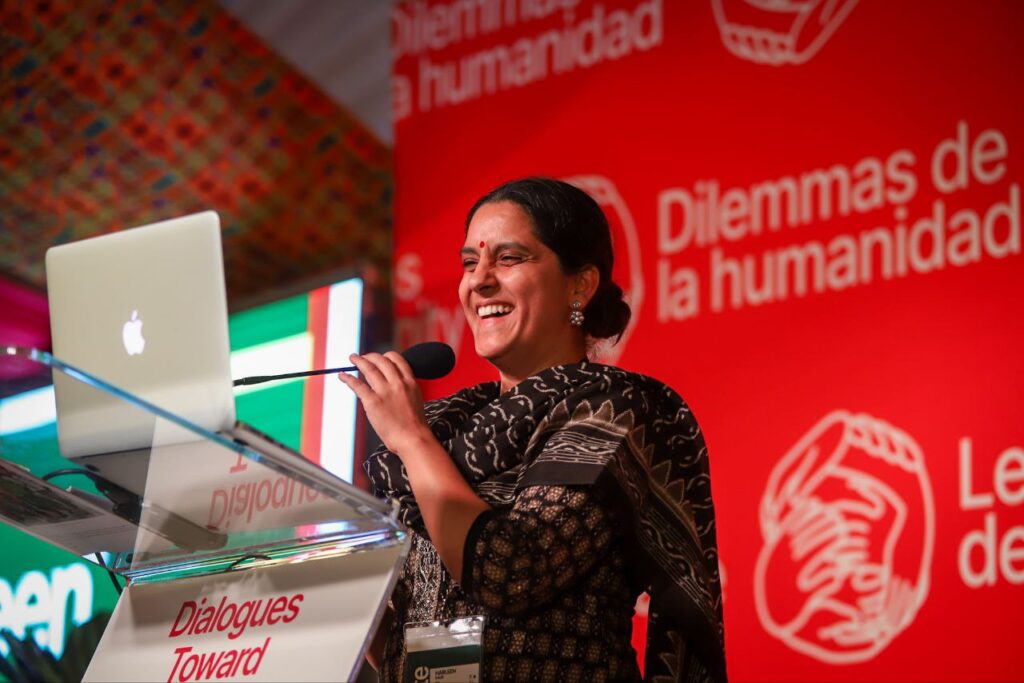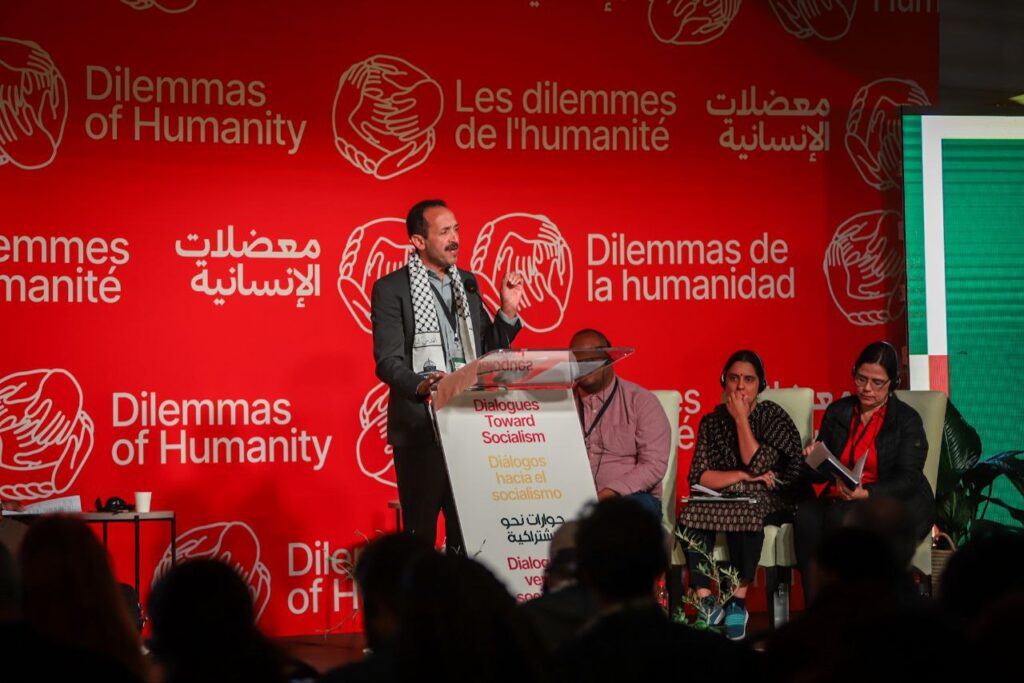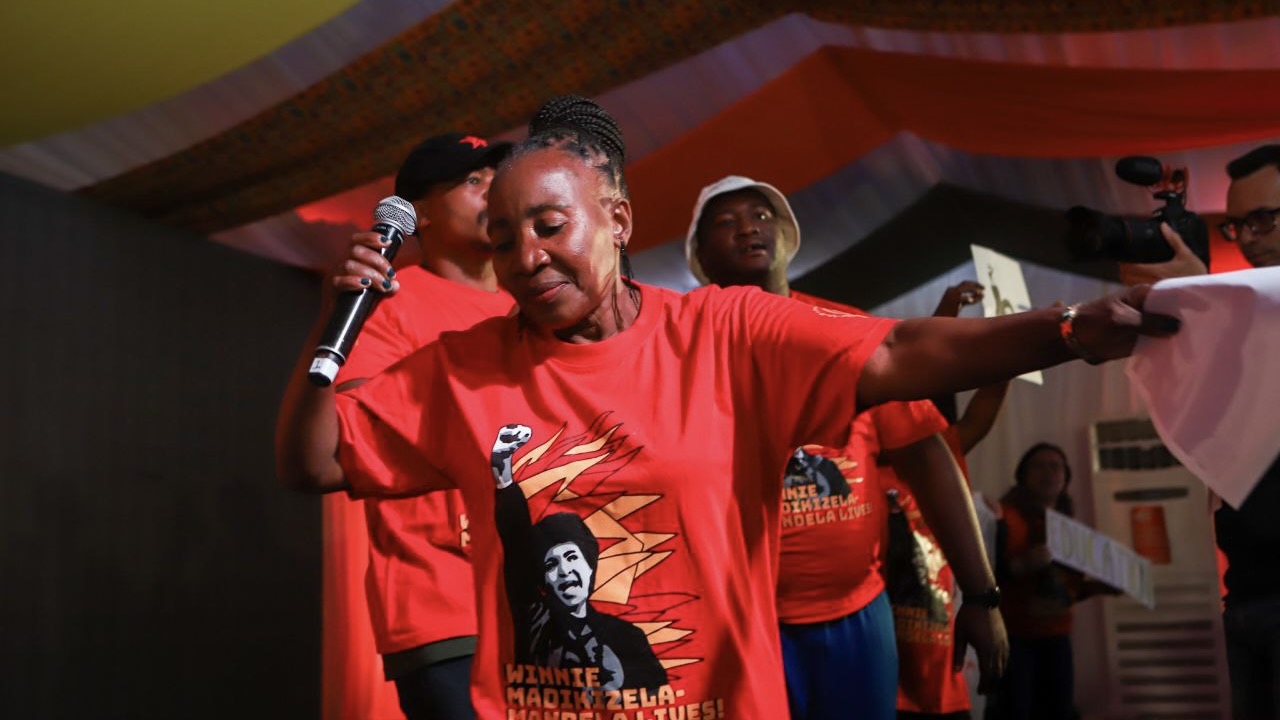“Where I come from, we believe that democracy must be built from below, and by the daily basis struggles that we face as the working class. It must be built with the unity of the working class.” With these words, the leader of South Africa’s largest social movement, Abahlali baseMjondolo Mqapheli Bonono inaugurated the Popular Democracy panel on Tuesday October 17. The discussion took place on the fourth day of the III International Dilemmas of Humanity Conference in Johannesburg, South Africa.
The panel which featured Venezuelan Deputy Blanca Eekhout, Jamal Berajaa, from the Workers’ Democratic Way in Morocco; Harleen Kaur, from the Tricontinental: Institute in India; and Eugene Puryear, from the Party for Socialism and Liberation of the United States, was focused on presenting concrete examples of popular democracy as well as debunking the liberal, bourgeois notions of democracy. Speakers underscored that for true democracy, there has to be full participation of the majorities in the country.
“Democracy has to be revolutionary, it has to transform. Bourgeois democracy is not revolutionary. The will of the people is being hijacked, there is no sovereignty. We who propose to build socialism through democracy talk about revolutionary democracy, it has to transform from below,” the Venezuelan revolutionary deputy told participants.
Peasant movement in India
Harleen Kaur, from the Tricontinental: Institute in India, focused her intervention on contrasting the anti-people, right-wing actions of the Narendra Modi government with examples of movements building popular democracy in struggle, specifically the Indian farmers’ movement.
While the situation in the Indian countryside had produced “impoverishment and demoralizations” and led to the suicide of over 400,000 farmers, this same “existential threat forced farmers to come out on the streets against the neoliberal access of the State, and the Bretton Woods institute.”
Kaur described the year-long farmers’ struggle against neoliberal, corporate policies as “a process of popular democracy in front of you. Workers and peasants supported each other across the country in the calls of strike.”
Kaur also pointed out that the active and leading participation of women in the farmers movement was transformative, both for women recognizing themselves as subjects and active agents of struggle, as well as breaking societal prejudices.
“Women are recognized as an important agent in this class struggle,” she said. “When people take on agency, leadership roles, it’s a form of true, popular democracy.”

However, Kaur highlighted that this example of people’s democracy still took place within a country governed by a right-wing, fascistic government, and as such the repression doled out against those that participated and those that covered it was harsh.
This was the case with the Indian government’s attacks and harassment of nearly 100 journalists and employees with the progressive Indian news outlet Newsclick and Tricontinental Research Services. Yet Kaur insisted that these attacks would not silence them or the people’s movements in the country.
“We are the creative forces of history and these attacks will force us to find new creative ways of existence, of being together with the struggles, and documenting it. We’ll keep writing for the movements and with the movements,” she said.
Revolutionary democracy
Venezuelan Deputy Blanca Eekhout used the example of the Bolivarian revolution to highlight the concept of popular democracy.
“When people ask us how we have managed to maintain the Bolivarian revolution for 24 years under the attacks of imperialism, under an economic war that has led us to have 1% of the income. We resist because the people are the government, because the people have made a revolution, because our democracy is revolutionary,” said the Deputy of the National Assembly and President of the Commission on Building Communes.
According to Eekhout, in order for popular projects to become irreversible, it is necessary to build instruments that allow the people to play a leading role.
“This is a fundamental issue in what revolutionary democracy means. We can’t talk to the elites, we can’t make alliances, we need to immediately tell the people: your will will be respected. You are the ones who make the decisions,” she explained.
“Commander Chávez used to say: the people are not just a group of people in a territory. We need to have a common feeling, we need to have a common project, to collectively imagine where we are going, and that all dreams are shared,” she added.
Democracy in Morocco is in name only
Jamal Berajaa, from the Workers’ Democratic Way in Morocco, pointed out that his country cannot be considered a democracy.
“It’s a facade democracy that has developed within capitalist parasitism. We have a capitalism in Morocco dependent on foreign markets. It is at the service of monopolies, a system that was formed before Morocco’s independence. We didn’t become independent,” said Berajaa.

“The Moroccan people have become more aware, more conscious, they have really become involved in the struggle including peasants and workers, [the regime] is isolated and has no tools except oppression and inundating the country with debt,” added the worker leader in Morocco.
“More than 80% of morrocans boycott elections…I think we do not have a democracy and the Moroccan people are aware of this,” he said.
Liberal democracy in crisis
For Eugene Puryear, of the Socialism and Liberation Party of the United States, people’s distrust of the “democratic” system in the US is evident in the falling numbers of voters and people engaging in politics. This is coupled with a widespread lack of faith in capitalism itself, and the contradicting insistence from the ruling class that the system is viable.
According to the writer and journalist, a full democracy depends on the ability of the people to have direct control over resources.
“We must remember not to give too much credit to the bourgeoisie. Most of what we know as liberal democracy, freedom of the press, free speech, however limited it may be, was not given as a gift. It was taken by struggle, by the blood of workers and oppressed people who were fighting for representation in their society,” said Puryear.
For the Breakthrough News host, popular and socialist democracy must challenge the entire oppressive hierarchy that is being established under capitalism.
“It has to mobilize and empower those who have been the most affected. There is no democracy if women and oppressed nationalities are not empowered in a real way,” added Eugene Puryear.
Dilemmas of Humanity
Members of parliament, intellectuals, and movement leaders from 120 organizations and over 70 countries, gathered from October 14-18 for the III International Dilemmas of Humanity Conference to exchange experiences and outline ways to confront the crisis in neoliberalism and point out practical actions for building socialism.
“We must be able to reject all forms of divisions amongst the working class…all forms of oppression that are being imposed on us by the capitalist system,” said Mqapheli Bonono, the leader from the shack dwellers movement.
With reports from Brasil de Fato.





